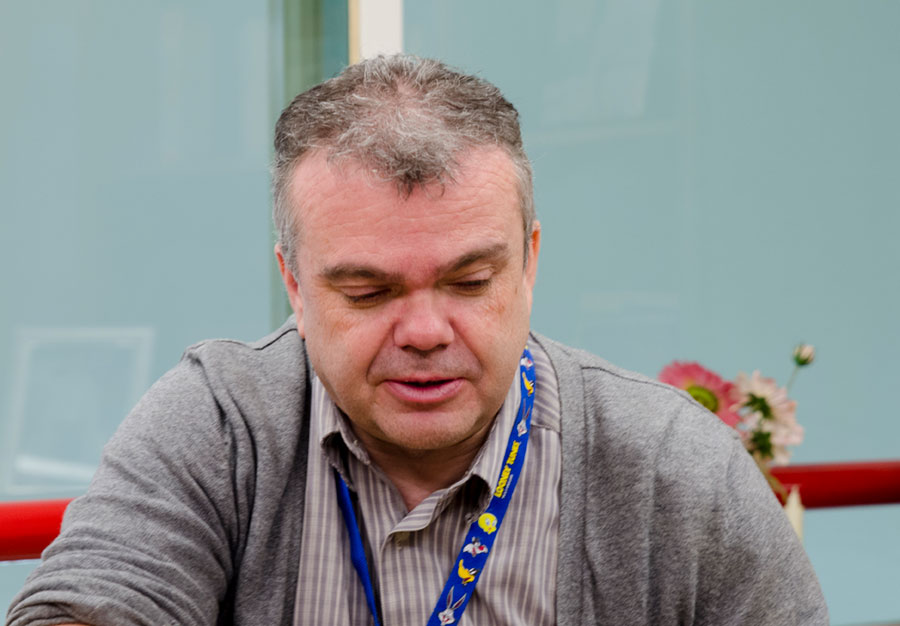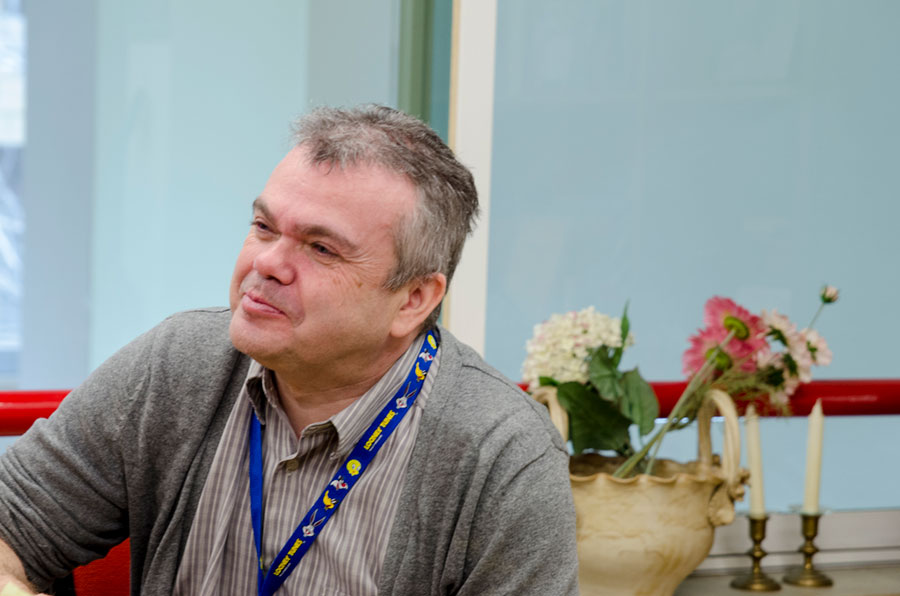Cliff Parry (MSc TEYL, RSA DTEFLA, BSc, Dip. Management) is Academic Manager at the British Council Greece and has been living and teaching in Greece since 1986. He has a wide range of teaching experience across all course types and ages, as well as extensive training experience. He has written numerous articles for professional journals and ELT publications, and has co-authored a number of English language teaching titles. He has also worked on social inclusion projects for a number of years.
Did you always want to become a teacher?
No, no way. It’s not that I’m ashamed of what I do. It’s just that it’s not what was planned. I went to university and studied mining engineering looking forward (?) to a career in the pits until they were closed. Unemployed, in love (with a Greek), I packed my bags, booked a cheap charter and headed off for Athens in search of new beginning or a happy ending – I don’t know – in any event I think I found both – I went to bed with brickworks and rusting pitheads and woke up with a new lover – a new profession and a new home under the eternal blue skies of Greece.
What was the situation in ELT when you started teaching?
One thing was for sure – I had no idea how difficult teaching was and still is – but I suppose like countless unprepared souls before me and without doubt thousands to follow, I walked into my first class with childish confidence and an English teacher’s bible – a grammar book – a well-thumbed Thomson and Martinet with strange chapter titles like “Simple Present”, “Present Perfect” and “Adverbial Clauses”. I’d never seen such a book before and at the time it seemed to me that it should have been issued with a “health warning” – it’s rules and examples struck me with waves of terror when I realized that I didn’t speak proper-like – so much terror that I didn’t want to speak at all! On reflection, it’s only when you get to grips with such books that you realize we Brits speak anything but correct English but that’s another story.
The bedrock of more effective and efficient instruction is setting and maintaining meaningful relationships with students. Do teachers know how to do it?
Is teaching a discourse in which everyone waits their turn to speak and no one truly listens? Is it a discourse of memorization in which ready-made phrases, ideas, formulas and patterns are reiterated over and over again?
No it’s a partnership. A few weeks ago, I was part of a wonderful story, the memory of which seems to grow inside me. I had been invited to a primary school to teach a class about the Olympic values. At the back of the classroom sat a little boy who was different – he had Down’s Syndrome. For twenty minutes or so he sat there smiling when the others smiled but not particularly absorbed in what was happening. And then slowly the other children realised that he was there and without thought nor hesitation, they took him by the hand and proudly brought him to sit next to me. And there he sat smiling when the other children smiled, laughing when they laughed, jumping when they jumped – totally absorbed not by me or the lesson but by the rich embrace of the children. It was a wonderful experience and taught me much about what teaching really is.
Has teaching changed or we still teach the way we were taught?
It’s summer 2014. I’m confused and even close to tears. I have been timetabled for some very different teaching – far from the traditional language lesson where grammar and words are explained or discovered and students scramble through pages and papers and photocopies in a quest for fluency. No, this summer school will be different. No more revision for the weak, no more challenges for the strong, this summer school will be about art, science, fun and games and all in English – a great idea (since it was mine!) and now a reality. But to be honest, my stomach is churning, morning sickness perhaps and now just for a moment, I am filled with doubts – can I do it? Can I teach anything more than language and anything different than the book? Can I? Of course I can!!!
{loadmodule mod_random_image,call to action subscribe in articles}
How difficult is it to change?
I accept change but it is inherently worrying and no matter what rhetoric or noble words are used to paint a picture of a brighter future, we as individuals will always see change as threatening not only at an emotional level (How will I be affected?) but also socio-politically (how will my standing be affected?) and a rationally (Is there any other way?). For me, for change to be acceptable, there must the promise of benefit for myself or my children. So, when change comes I ask where is the promise to the people?
If you could go back what would you change in your teaching?
I think I would have encouraged learners to dream more. We have all had dreams some of which we have turned into reality, others which have changed the people we are and yet others which are still dreams – distant and remote. Learners need to have dreams – not of the impossible kind but positive, achievable real aspirations which can become goals to be achieved over a period of time and it is the sacred responsibility of teachers to help those dreams come true.
The bedrock of more effective and efficient instruction is setting and maintaining meaningful relationships with students. Do teachers know how to do it?
What makes for effective and efficient instruction? Is it patience, love or compassion? Is it maturity, responsibility, decisiveness? Is it courage, selflessness or enthusiasm or is it flexibility, punctuality and preparedness? What makes for effective and efficient instruction? Well judging from the inspirational teachers I’ve met all over the world – all of the above and more!

Have you ever felt embarrassed or insecure in the classroom?
Yes often but never more so than my very first lesson in my very first class. My first students – George, Spyros, Maria and Rania – only 4 (I wonder if the others had taken one look at me and realized that learning lay on other shores!) With one exception, all were in their early twenties – students at one university or another - and reminded me very much of some of the people I’d left behind in Wales. George, on the other hand was older, maturer, infinitely wiser but cold, colder – for him learning English was a duty imposed by necessity rather than a joy or a hobby – it certainly wasn’t fun and his every expression, his every sound underlined it. George had such a profound effect on me that even today on the rare occasions that I return to the UK and spot a pub called The George, my mind fills with dark clouds that chase away the gallant mounted figure on the pub sign. But, despite George I was feeling confident. So there I was – my first class, my first lesson, my first real challenge – to clean a whiteboard. No tissues, no paper, no board cleaner – oh what the heck, I few broad strokes of my hand and the board was clean – my hand less so. Now it was September and like most Greek Septembers, it was warm –with no air-conditioning and only an old fan whirring and clattering away in the corner – cooling itself but not much else, the classroom was unbearably hot. Phew very hot I thought as I wiped the sweat from my brow. Very hot indeed – my class no longer had the energy to write. Phew I wiped the sweat away again. Why was Maria staring at me? Why was George staring at me and Rania too? Then it dawned on me …. my board-rubbing hand was surprisingly clean – the same could not be said of my face.
Does routine teaching make teachers ‘lazy’?
Teaching touches the lives of others. How much does a simple greeting touch the heart of the child as he/she walks into the class? Is the tired boy sitting opposite you influenced by a smile when your eyes meet? Routine doesn’t mean there is no challenge. Routine doesn’t make you lazy. The challenges are the same.
What are the appropriate teacher-student boundaries?
Musicians love the sounds and the music they make, poets and writers love their words, dancers love movement and mathematicians love numbers. People who fundamentally love what they do don’t think of it as work in the ordinary sense of the word – they do it because they want to do it, they do it because when they do it, they can create – yes love breeds creativity and love of teaching not only creates great lessons but also great people. You’ve got to love the people in front of you.
How do you see ELT in say…10 years from now?
Language is a tool and language learning necessarily involves not only acquiring knowledge and understanding of the language as a code but the skills and aptitudes that define an effective user of the tool itself such as critical thinking, the ability to analyse information, express opinions, take part in discussions and debates, negotiate, resolve conflicts and participate positively in society. The future of language teaching should not just provide an opportunity for practice of the code but reinforce the values and dispositions which govern society - respect for justice, democracy and the rule of law, openness, tolerance, courage to defend a point of view and a willingness to: listen to, work with and stand up for others.•
